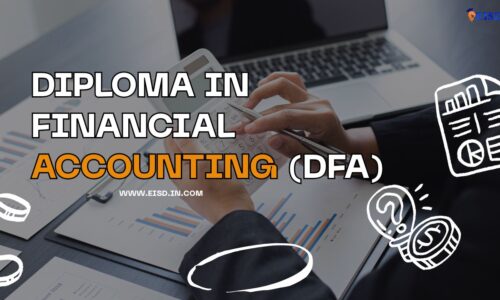Diploma in Financial Accounting (DFA)
In today’s business environment, financial expertise is essential for corporate management, accounting professionals, and business analysts. Our Diploma in Financial Accounting (DFA) is designed to provide students, accounting aspirants, and finance enthusiasts with comprehensive knowledge and practical skills in financial accounting, corporate financial reporting, financial strategy, and taxation.
Each subject carries 100 marks, combining theoretical knowledge with practical exercises. By completing this course, students gain the ability to manage financial records, prepare reports, implement financial strategies, and ensure compliance with taxation laws, thereby enhancing career opportunities in accounting, finance, and corporate management.
Why Enroll in the Diploma in Financial Accounting (DFA)?
Industry-Oriented Curriculum
The course covers essential areas of financial accounting, corporate reporting, strategic finance, and taxation applicable in corporate and business settings.Hands-On Practical Training
Students work on real-world accounting projects, preparing financial statements, reports, and analysis that simulate professional business scenarios.Expert Faculty
Our instructors are experienced accountants and finance professionals who provide guidance, mentorship, and insights into current industry practices.Certification for Career Advancement
Completing the DFA course provides a recognized credential that enhances employability in accounting, corporate finance, auditing, taxation, and management roles.Flexible Learning Options
We offer online and offline classes with schedules suitable for students and working professionals.
Course Subjects – Detailed Learning Modules
The Diploma in Financial Accounting (DFA) consists of four core modules, each carrying 100 marks. The curriculum provides technical knowledge, practical skills, and professional expertise required for careers in accounting, finance, and corporate management.
1. Financial Accounting (100 Marks)
Financial accounting forms the foundation of business finance management.
Topics include:
Basics of accounting principles and concepts
Journal entries, ledger accounts, trial balance, and final accounts
Double-entry system and accounting standards
Recording, analyzing, and reporting financial transactions
Practical exercises in accounting processes
2. Corporate Financial Reporting (100 Marks)
Corporate financial reporting is crucial for transparency, compliance, and decision-making.
Topics include:
Preparation and interpretation of financial statements
Balance sheets, income statements, and cash flow statements
Accounting for assets, liabilities, and equity
Compliance with corporate accounting standards and regulations
Practical projects in financial reporting
3. Financial Strategy (100 Marks)
Financial strategy enables businesses to achieve growth, profitability, and sustainability.
Topics include:
Financial planning and budgeting
Investment analysis and capital allocation
Risk management and cost control strategies
Long-term financial decision-making
Practical exercises in corporate finance strategy
4. Taxation (100 Marks)
Taxation knowledge ensures compliance and optimizes financial performance for businesses.
Topics include:
Principles of taxation and regulatory framework
Corporate taxes, income tax, and GST
Tax planning and compliance strategies
Filing returns and managing tax documentation
Practical taxation exercises
Conclusion
The Diploma in Financial Accounting (DFA) is a comprehensive program that prepares students for careers in accounting, corporate finance, auditing, taxation, and financial management. Covering subjects such as Financial Accounting, Corporate Financial Reporting, Financial Strategy, and Taxation, this course provides theoretical knowledge, practical experience, and professional expertise essential for success in finance and business management.
For enrollment details, batch schedules, and fee information, visit our website or contact our support team. Advance your career in accounting and finance with the Diploma in Financial Accounting (DFA) and become a skilled professional in corporate finance and taxation.

